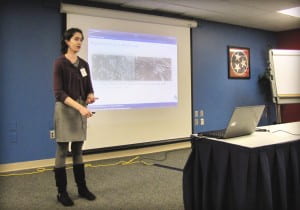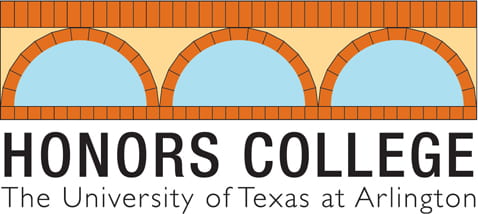 Honors student Elizabeth Stephenson is already a pioneer of research in mathematical biology — and she’s only a junior. While she’s getting her bachelors degree in pure math, she’s building on the understanding of muscle healing with equations.
Honors student Elizabeth Stephenson is already a pioneer of research in mathematical biology — and she’s only a junior. While she’s getting her bachelors degree in pure math, she’s building on the understanding of muscle healing with equations.
For Stephenson, it’s the love of math that inspires her work.
“I enjoy seeing how something so simple can model so many powerful things in our universe and condense huge amounts of data into simple elegant equations,” she said.
Recently, Stephenson presented her research on the modeling of skeletal muscle regeneration at the National Institute for Mathematical and Biological Synthesis undergraduate research conference in Knoxville, Tennessee.
Mathematical biology is an interdisciplinary research field that applies biology, biotechnology and medicine to help understand biological processes. Essentially, math equations are used to describe what happens to our organs, cells and everything in between and around.
Stephenson is currently working on a system of equations that describes the healing process of cells in injured muscle. While extensive research has already been done on muscle regeneration, she’s looking at the mathematical modeling specifically for muscle tissue that is damaged but disease-free.
Think of the healing process after a crushed muscle or a large burn. That’s what Stephenson is helping to reveal using the language of math.
“A small strain in the muscle is modeled completely differently than this kind of model,” she said.
Stephenson’s decision to study mathematical biology came about as sort of an accident. This past summer, after receiving a grant from the Louis Stokes Alliances for Minority Participation, Stephenson was planning to do research on campus focused on pure math. But she had to pick another field to study when the researcher she planned to study with went on vacation.
By random choice, she decided to go with Dr. Hristo Kojouharov to help with his research in mathematical biology. When at first, she didn’t know much about the field, she grew fond it.
“I like mathematical biology because it’s practical and it uses the math that I love and find beautiful to help heal people that are injured or help model the processes of everyday life,” she said.
Stephenson says the lessons she has learned with Dr. Kojouharov have only further inspired her passion.
“I’m learning how to ask difficult questions and not give up until I find the answers,” she said. “As well as how to sift through massive amount of information.”
In her free time, Stephenson likes to paint, knit and play piano. She’s also a tea aficionado. As for her future prospects, she wants to continue her studies and eventually get her PhD in pure math. Then maybe travel and, ideally, end up up at Cambridge University in England.
As for short term goals, she just wants to drink another cup of tea.
“Hey,” she said. “You have to have short term and long term goals to be successful!”
